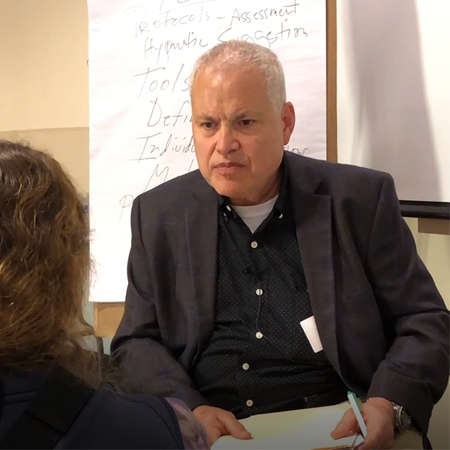This is because it is so liberating to be free of pain! When you are pain free, it is as if the pain was part of a bad dream you can’t remember much of.
- If you suffer from chronic pain, book an private online or office session with Dr. Eimer here.
- Health professionals and hypnotherapists can learn how to give the gift of hypnotic pain relief at my live Pain Control Hypnosis Practitioner Courses as well as by taking this course online here.
- If you are a professional hypnotherapist, complete our course, and return to your hypnotherapy practice prepared to teach client’s suffering in pain how to transform their daydreams of less pain into waking reality.
Some
people are more complicated than others. When a client goes to a hypnotherapist
for help and does not get better, it is never the client’s fault. It is that
the therapist does not have the requisite skills, knowledge or personality to
effectively help the client. Now hypnotherapists can acquire these skills here.
Training
for hypnotherapists and health professionals.
We offer
intensive one-day, two-day, and three-day fundamental and advanced Pain Control
Hypnosis Practitioner courses. These courses are designed for professional
hypnotherapists, physicians, physician assistants, nurses, chiropractors,
physical therapists, occupational therapists, dentists, psychologists,
psychiatrists, social workers, and other mental health professionals. All of
these practitioners see patients with severe acute and chronic pain in their
respective fields, and are in a position to offer precise hypnotic pain relief
if they know what to do and how to do it.
The
real world of pain
is a lot more complicated and much less black-and-white than the distinctions and
generalizations given in textbooks or on this website. Effectively treating any
patient or client with hypnosis for pain control demands empathy, compassion,
wisdom, knowledge, technical know-how, experience, interest, good intentions,
good training, and a competent intake evaluation. It also requires a thorough
knowledge of hypnosis, good hypnosis training, and adequate knowledge of pain mechanisms,
human physiology and neurology, and psychology.
Acute
pain requires an
appropriate medical or dental work up. If you can confidently and competently
explain to a client or patient the cause of the client’s pain, if you know it,
and how treating the cause will alleviate the pain, this is likely to reduce
the client’s anxiety. However, if the patient’s work-up doesn’t identify a
treatable or fixable cause, we must address the patient’s anxiety. It has been
said that the fear of pain is often worse than the pain. This is so true, plus fear
can make pain worse too.
Chronic
pain also requires
an appropriate medical or dental work up. However, chronic pain is way more
complicated. Living with severe and unrelenting chronic pain makes most people
experience some type of depression. And depression makes pain worse. Successful
employment of hypnotic techniques for altering pain sensations and distracting
the client his/her preoccupations with the pain requires that the client believes
that you take him or her seriously and that you agree that the pain is real and
NOT all in the client’s head.
FACT.
All pain is real.
With chronic pain, there is almost always old emotional baggage that needs to
be released. Hypnosis practitioners learn how to do this effectively in our
courses. The problem of controlling chronic pain is compounded when a patient
is diagnosed with a medical condition that isn’t going to go away. Patients
with chronic or debilitating medical conditions associated with persistent pain
face the challenge of figuring out how to get along with their pain and somehow
make peace with it.
It is
the Pain Control Hypnosis Practitioner’s job to help patients with pain to
accept their condition medically and accept responsibility for what they do
about it.
It is
the Pain Control Hypnosis Practitioner’s job to help patients with pain build
ego strength, self-confidence, self-love, find faith, develop curiosity, and mobilize
courage in order to be able to learn new pain coping skills.








